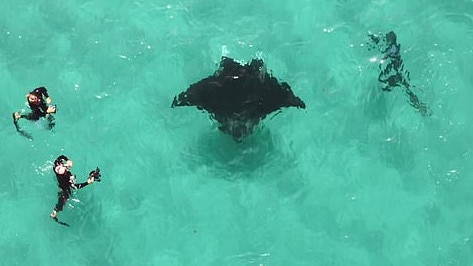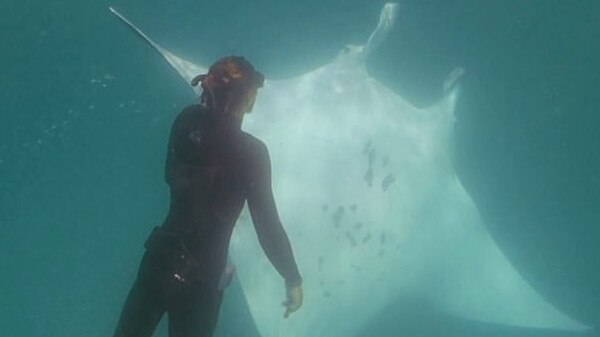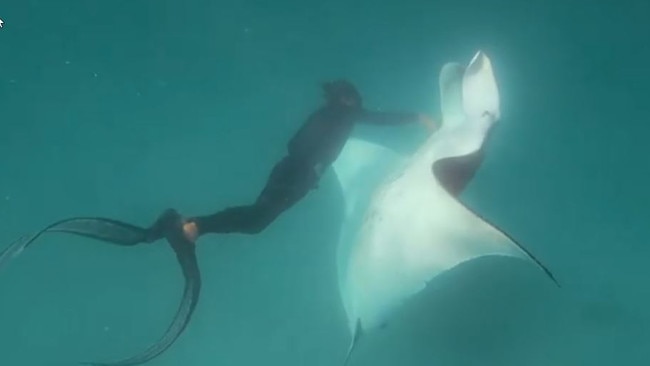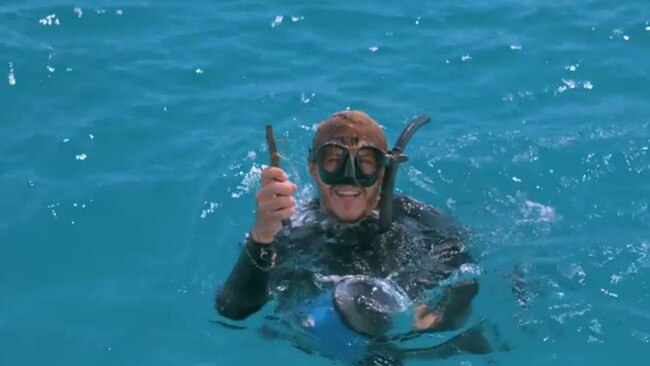Stricken giant Manta ray asks snorkellers for help
When Freckles the manta had a painful problem she turned to her human friends | WATCH

Freckles, a giant manta ray, is about 30 years old.
In her time she’s beguiled hundreds of visitors to the shallow lagoons of Ningaloo Reef, a stretch of the Indian Ocean off Western Australia known for its extraordinary marine life.
But one group of snorkellers recently realised that theirs was no ordinary encounter because Freckles, it appeared, was asking for their help.
As the ray, which measures 3 metres across, swept through the water she seemed to recognise Jake Wilton, a wildlife guide who was leading half a dozen other swimmers, and approached him.
When the animal rolled over and hung still, Mr Wilton was able to spot the problem: three fishing hooks were snagged under her right eye.
Mr Wilton, 28, said: “I’m often guiding snorkellers in the area and it’s as if she recognised me and was trusting me to help her.”
Manta rays have the largest brains of any fish and the manner in which they co-ordinate their feeding in large groups suggests a social intelligence.
They are one of the few species that appear to recognise themselves in a mirror, a feat that eludes cats and dogs. This ability puts them in rarefied company alongside great apes, bottlenose dolphins and Asian elephants.

“Mantas are well known for having the highest cognitive, emotional and mental functions of any of the sharks and rays,” Monty Halls, a British marine biologist who was with the diving party, said.
“Research suggests they may have near-mammalian levels of intelligence and empathy. When you have eye contact with them, they stay with you. They’re very curious, they build relationships.”
‘She had to show me’
Mr Wilton spent several minutes swimming alongside Freckles before trying to get a closer look at her injury. The ray unfurled her lobes, two horn-like protuberances on the side of her head. It was only then that he could see the three hooks.
“She had to unroll her lobe to show me where the hooks were embedded,” Mr Wilton said. “She knew exactly what was going on. She had to show me, give me access. It’s incredible for an animal to work that out so quickly.”
Rays rely on their vision. Concerned that Freckles’s injury would become infected and blind her, Mr Wilton set about trying to extract the hooks with a pair of pliers.
The giant manta ray, a peaceful cousin of the shark, is listed as “vulnerable” by the International Union for Conservation of Nature.

They can grow to be 7 metres across and spend most of their life far from land, travelling on the currents and feeding on plankton, small fish and crustaceans. Unlike stingrays they are not armed with a tail spike and are harmless to humans.
Still, removing a hook from such a massive creature demands a delicate touch. Mr Wilton, swimming in water that was about 5 metres deep without oxygen tanks, made a dozen attempts.
The scene reminded Mr Halls of taking his children to the dentist. Freckles would stay still until the last moment. Just as the pliers approached, she would flinch and pull away.
“The interesting thing is that, again and again, she kept on returning to Jake,” Mr Halls said. “I’m sure that manta knew that he was trying to get the hooks out.”

To his relief Mr Wilton finally managed to remove them. “I went down again, just to say goodbye and she actually stopped and just waited there,” he said. “For the wildlife to completely embrace you, that’s very special. I bawled my eyes out afterwards — that says it all.”
Mr Halls said: “It’s dangerous to anthropomorphise too much, isn’t it? But we felt that it was saying thanks.
“That was the moment, I think, that profoundly affected everyone in the group.”
Two weeks later Mr Wilton was overjoyed when he saw Freckles again. “She was feeding and she stopped right on top of me and sat there for probably 20 seconds. It was as if she recognised me,” he said.
The Times



To join the conversation, please log in. Don't have an account? Register
Join the conversation, you are commenting as Logout